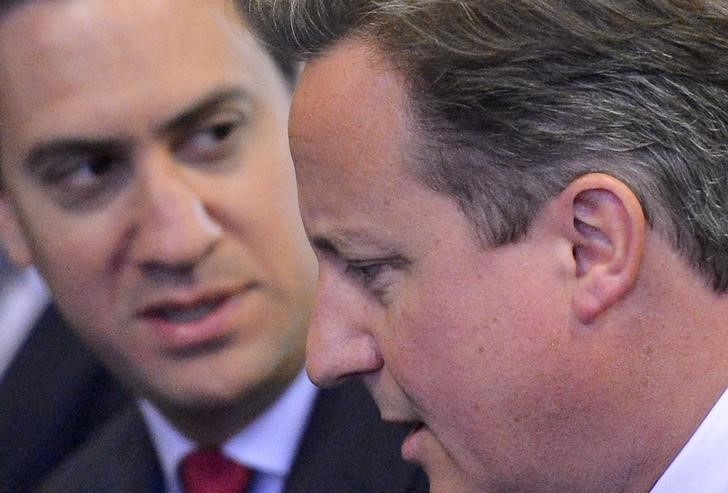By Michael Holden
BRIGHTON, England (Reuters) - Britain's resurgent Greens are threatening the Labour Party's hopes for election victory in May even though the leftist environmentalists will probably capture no new parliamentary seats and could even lose the only one they hold.
Ed Miliband's main opposition party is neck and neck with Prime Minister David Cameron's Conservatives, so every voter who leaves Labour for the Greens could push Cameron closer to a second win under Britain's first-past-the-post electoral system.
"Every vote you give to the Green Party makes it easier for David Cameron to stay on as prime minister," said Sadiq Khan, a senior Labour lawmaker who has been specially charged with creating a strategy to counter the Green threat.
"If you don't vote Labour, if you vote for the Green party in some seats, it could mean you're helping a Conservative member of parliament to be returned."
At the last national ballot in 2010 the Greens claimed their first Westminster seat but polled only 1 percent of the vote. The party, seen as fringe activists, has never been the major political force in Britain that it is in European countries such as Germany where, since merging with the Alliance 90 party, it has over 60 seats in the Bundestag.
However surveys show that might be about to change as voters turn away from the two parties which have dominated Britain's political system for a century and as Labour voters become disillusioned with their party's commitment to cutting public spending.
While the Green party's anti-austerity message is unlikely to cause the political earthquake of Syriza, which won last month's election in Greece, one recent opinion poll put its support as high as 11 percent.
Over the past few months the Greens have scored between 6 and 9 percent, often higher than the Liberal Democrats that are the junior coalition partner in Cameron's government.
EVERYTHING MATTERS
The swing to Green is a major headache for Labour, which has already lost droves of traditional working class supporters to the Scottish National Party after that country's independence referendum last year.
It is also battling to stem the flow of votes toward the anti-European UK Independence Party (UKIP) which has capitalised on the resentment of an austerity-weary public and accuses the European Union of opening the flood gates to "job stealing" immigrants.
Now another 22 constituencies out of the 650 that Labour must hold or capture to win the election are under threat from the Greens, estimates Rob Ford, a senior lecturer in politics at the University of Manchester.
"It's a horrible position for Labour to find themselves in," Ford told Reuters. "They're basically finding their electoral coalition being eaten away at both ends and...can't appeal to one group without offending the other."
"If half a dozen seats don't go to Labour because of the Greens and Labour are three seats behind the Conservatives, then that matters. Everything matters in this election."
Three of those seats lie next to each other on the English south coast: Hove, Brighton Kemptown and Brighton Pavilion which in 2010 became the first parliamentary seat to be won by Caroline Lucas for the Greens.
"A lot of people who are joining us are people that might have looked at the Labour Party in the past," she said, adding that there was a general sense of dissatisfaction with Labour and the Conservatives.
"People want an alternative to believe in and none of the other parties are giving it."
It's not just in the polls that the Greens are seeing a boost. Since the start of the year, the party's membership has rocketed beyond 50,000, ahead of UKIP and the Lib Dems.
"PEOPLE WANT CHANGE"
In the 1950s, Labour and the Conservatives, often referred to as the Tories, together won more than 95 percent of all votes cast. Now polls show they attract just 65 percent, with both the Greens and UKIP, polling at 16 percent, doing better than ever.

"People want to vote for change, it's exciting times. I feel people are tired and the Greens are offering something different," said David Gillespie, 29, who joined the party in the first week of January. He has never voted before, though his parents are Labour supporters.
"I just thought nothing would make a difference," he told Reuters at one of the busy cafes lining Brighton's narrow lanes. "There was certainly nobody out there that represented me."
Other new members voice the same disillusionment. Helen Dixon, 56, a writer and aid development teacher, joined the Greens three weeks ago despite the fact that her sister was a Labour councillor, her niece is a current Labour councillor and her parents met through the party.